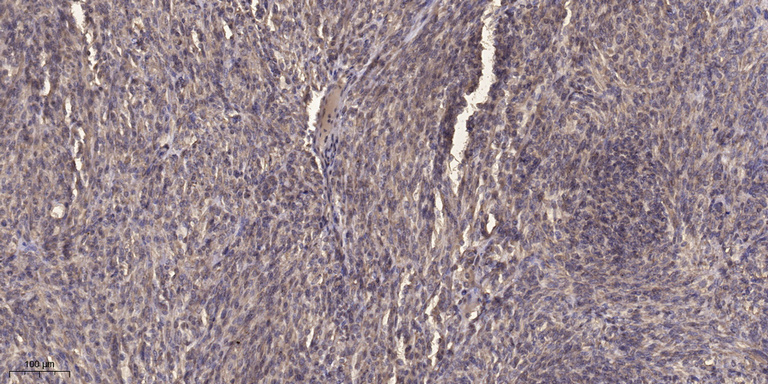DD1 Polyclonal Antibody
- Catalog No.:YT1304
- Applications:IHC;IF;ELISA
- Reactivity:Human
- Target:
- DD1
- Fields:
- >>Steroid hormone biosynthesis;>>Metabolism of xenobiotics by cytochrome P450;>>Metabolic pathways;>>Chemical carcinogenesis - reactive oxygen species
- Gene Name:
- AKR1C1
- Protein Name:
- Aldo-keto reductase family 1 member C1
- Human Gene Id:
- 1645
- Human Swiss Prot No:
- Q04828
- Immunogen:
- Synthesized peptide derived from DD1 . at AA range: 30-110
- Specificity:
- DD1 Polyclonal Antibody detects endogenous levels of DD1 protein.
- Formulation:
- Liquid in PBS containing 50% glycerol, 0.5% BSA and 0.02% sodium azide.
- Source:
- Polyclonal, Rabbit,IgG
- Dilution:
- IHC 1:100 - 1:300. ELISA: 1:10000.. IF 1:50-200
- Purification:
- The antibody was affinity-purified from rabbit antiserum by affinity-chromatography using epitope-specific immunogen.
- Concentration:
- 1 mg/ml
- Storage Stability:
- -15°C to -25°C/1 year(Do not lower than -25°C)
- Other Name:
- AKR1C1;DDH;DDH1;Aldo-keto reductase family 1 member C1;20-alpha-hydroxysteroid dehydrogenase;20-alpha-HSD;Chlordecone reductase homolog HAKRC;Dihydrodiol dehydrogenase 1/2;DD1/DD2;High-affinity hepatic bile acid-binding protein;HB
- Observed Band(KD):
- 37kD
- Background:
- This gene encodes a member of the aldo/keto reductase superfamily, which consists of more than 40 known enzymes and proteins. These enzymes catalyze the conversion of aldehydes and ketones to their corresponding alcohols by utilizing NADH and/or NADPH as cofactors. The enzymes display overlapping but distinct substrate specificity. This enzyme catalyzes the reaction of progesterone to the inactive form 20-alpha-hydroxy-progesterone. This gene shares high sequence identity with three other gene members and is clustered with those three genes at chromosome 10p15-p14. [provided by RefSeq, Jul 2008],
- Function:
- catalytic activity:17-alpha,20-alpha-dihydroxypregn-4-en-3-one + NAD(P)(+) = 17-alpha-hydroxyprogesterone + NAD(P)H.,catalytic activity:Indan-1-ol + NAD(P)(+) = indanone + NAD(P)H.,catalytic activity:Trans-1,2-dihydrobenzene-1,2-diol + NADP(+) = catechol + NADPH.,enzyme regulation:Inhibited by hexestrol with an IC(50) of 9.5 uM, 1,10-phenanthroline with an IC(50) of 55 uM, 1,7-phenanthroline with an IC(50) of 72 uM, flufenamic acid with an IC(50) of 6.0 uM, indomethacin with an IC(50) of 140 uM, ibuprofen with an IC(50) of 950 uM, lithocholic acid with an IC(50) of 25 uM, ursodeoxycholic acid with an IC(50) of 340 uM and chenodeoxycholic acid with an IC(50) of 570 uM.,function:Converts progesterone to its inactive form, 20-alpha-dihydroxyprogesterone (20-alpha-OHP). In the liver and intestine, may have a role in the transport of bile. May have a role in monitoring the intrahepatic bile a
- Subcellular Location:
- Cytoplasm, cytosol .
- Expression:
- Expressed in all tissues tested including liver, prostate, testis, adrenal gland, brain, uterus, mammary gland and keratinocytes. Highest levels found in liver, mammary gland and brain.
- June 19-2018
- WESTERN IMMUNOBLOTTING PROTOCOL
- June 19-2018
- IMMUNOHISTOCHEMISTRY-PARAFFIN PROTOCOL
- June 19-2018
- IMMUNOFLUORESCENCE PROTOCOL
- September 08-2020
- FLOW-CYTOMEYRT-PROTOCOL
- May 20-2022
- Cell-Based ELISA│解您多样本WB检测之困扰
- July 13-2018
- CELL-BASED-ELISA-PROTOCOL-FOR-ACETYL-PROTEIN
- July 13-2018
- CELL-BASED-ELISA-PROTOCOL-FOR-PHOSPHO-PROTEIN
- July 13-2018
- Antibody-FAQs
- Products Images

- Immunohistochemical analysis of paraffin-embedded human Colon cancer. 1, Antibody was diluted at 1:200(4° overnight). 2, Tris-EDTA,pH9.0 was used for antigen retrieval. 3,Secondary antibody was diluted at 1:200(room temperature, 45min).



